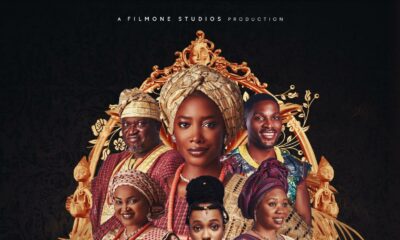Features
Adedamola Adedayo: “Far From Home” Caters to the Eclectic Existence of Young People

In chapter nine of Ben Okri’s multiverse fiction, Starbook, the author brings up a hypothetical community of people obsessed with arts, noting that: “Art was their god and their devil; their destruction and their regeneration.” This Janus-faced consideration of arts has been carefully but coincidentally cut out in the Netflix Nigeria Young Adult series, Far From Home. In this series created by Chinaza Onuzo and Dami Elebe, we discover, with paradoxical interest, that the love and scorn for art are prioritised and captured.
To the teenage protagonist’s mother, Patricia Bello – a believable character played by Funke Akindele whose thought the director might have us rather disbelieve, arts is an all-malignant affair, a dead-end. No wonder, the begrudging woman, with accustomed cynicism, lambastes her son over his addiction to “the devil’s work.” Hardly forgiving her husband’s indiscretion which had resulted in the death of one of their children sometime in his art-storied past, she seems to be unarguable when she shuts her heart to the remaining two children’s lofty desires.
Amidst his mother’s nagging and hate for his passion, Ishaya Bello (Mike Afolarin) remains determined to explore all possibilities — the good, the bad, and the sordid. And he does really go nuts for money, giving the filmmakers an insidious point of overambition to prove. When he applies for the art fellowship and makes his mentor Essien’s shortlist, viewers interpret the development as a good possibility. A different temptation kicks in after the young man thinks he has outsmarted and stolen some money from his malignant bosses. Being Ishaya gets a new viewership definition: one whose integrity plays second fiddle to dreams. It is a bad possibility, which then gets more critical with the decision to save his head and his family’s dignity by volunteering to peddle drugs for the overbearing Government (Bucci Franklin) and Oga Rambo (Bolanle Ninalowo).
But when the film finally packs up, things have not fallen too apart to be put together again. Contrary to how substance abuse by young people is tragically presented in the 2019 Tope Alake-directed drama, 1Nimbe, the gravity of such indulgence in this series is not felt to the bones. Nonetheless, Far From Home, through this channel of facetiousness, leads us to serious conversations about moral boundaries and teenage life, as well as a muted conflict between traditional conservative values and modern hip culture. But, again, this too is handled with artful emotional appeasement.
Not many can see it coming when an awestruck Ishaya walks up to Essien and gets an insensitive response from the virtuoso. That was a passable sleight of irony. A not-really-famous poem, Hard Lines, by Nigerian academic Gbemisola Adeoti already states that: “some lines are bitter pills/hard to swallow with laughter…” With a similar insensitivity as when Ishaya trivialises his girlfriend-turned-ex, Adufe (Gbubemi Ejeye) when he says to her “I can’t marry anybody like this,” the director serves Ishaya a taste of his own medicine, an exemplary hard line, through that very man for whom the youngster has been compromising his morals. Essien hurls a sultry piece of advice when he is approached at the Founder’s Day occasion: “Don’t apply if you can’t afford to travel.” This sucks up any outstanding boyish passion in Ishaya.
Far From Home is not just about Ishaya and his maneuverings, but it is also, on the fringes, about what high schoolers do to feel cool and get high. Love, as revealed in uninformed adolescent desires, revels in apparitions of lust, deception, and betrayal. See how this plays out amongst Carmen Wilmer-Willoughby (Elma Mbadiwe), Atlas (Olumide Oworu), and Nnenna (Ruby Okezie). Alcoholism and drug use are, also, not circumspect to high schoolers, even though, occasionally, girls like Carmen, after emerging clear-headed from a bout of drunkenness, would have to think of the injury done to personal and family reputations. These may be themes for reflection in the bigger picture, but to the teenagers in the film, they are regular mediums for the expression of coolness and highness. Scenes of Wilmer Academy suggest that there is at least one sure way not to be considered uncool — don’t be a Denrele (Raymond Umenze).
But this is only season one, and we have to be patient to see what the director makes of this frigid guy in the follow-up, considering that he now seems to be catching feelings for Nnenna (even though he fails to clearly communicate his intention or, to start with, grab the attention of the lady with any romantic-seeming gesture) whose impatience can only be interpreted as lack of interest.
For this season, writer Dami Elebe is assisted by Chiemeka Osuagwu, Jola Ayeye, and Nkiru Njoku. It’s a toast to a promising collaboration, a fusion of domestic screenwriting pedigrees, yet it is Dami Elebe’s writerly zest that gives the series a strong-willed headstart. People may think that this quadruple has crafted some homemade Young Adult drama with a familiar Hollywood scent, but they should be enthusiastic at seeing a Nollywood version that caters to the eclectic existence of young people in the country today. Shall we continue to dumb down to conservative narratives? Shall we continue to pretend about young people doing silly stuff within and outside school walls right under the noses of parents and teachers? Even the anointing of a pastor cannot curb his teenage daughter’s libido.
Rating= 7.5/10





















